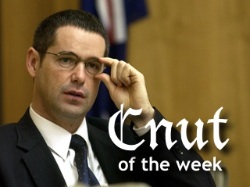Stilgherrian’s links for 31 January 2009, arranged by intensity of floral attitude:
- Twittering away standards or tweeting the future of journalism? | Reuters Blogs: Reuters News editor David Schlesinger tweets from Davos, beats his own news wires, and then blogs about the experience. If Twitter is changing journalism, his response is “Bring it on!”
- The LEGO Turing Machine | YouTube: The Turing Machine was a hypothetical computing device created by Alan Turing in 1936 to explain basic theoretical concepts in computing. While very simple, a Turing Machine is mathematically equivalent to any other general purpose computer, if slower. So, these guys have built one using LEGO Mindstorms components. The video has a bonus soundtrack via The A-Team.
- A radical idea: Charge people for your product | 37signals: The blog post is from November 2008, but the message is current given all the media flutter about Twitter — which has yet to earn a single dollar of revenue. Need income? Um, charge for your product!
- FORA.tv: “Videos Covering Today’s Top Social, Political, and Tech Issues.” I haven’t checked them out properly yet, so this is really a reminder to self.
- GoodBarry: These guys provide an integrated “Software as a Service” (SaaS) system for small business, covering eCommerce, content management (CMS), customer relationship management (CRM), email marketing and analytics. All hooked together, and all at good prices. I’m checking them out for a client.
- Life Matters’ Mandatory Internet Filter Transcript | Off Topic with Ashley: An unofficial transcript of ABC Radio National’s Life Matters program with network engineer Mark Newton and Jim Wallace, Managing Director of the Australian Christian Lobby.
- Mandatory internet filter | ABC Life Matters: On Thursday, ABC Radio National’s Life Matters interviewed network engineer Mark Newton and Jim Wallace, Managing Director of the Australian Christian Lobby. Audio available for download.
- The Economy According To Mint | TechCrunch: Mint is an online accounting system for consumers. Tracing their 900,000 customers through 2008 shows how their spending patterns have changed as the Global Financial Crisis worsens.
- Labor’s “deafening silence” as web censorship trials delayed | theage.com.au:
- Newspapers Saw the Digital Train A-Coming | Advertising Age: Bradley Johnson points out that the newspapers themselves were exploring digital delivery of news in the 1980s, but failed to do anything about it in terms of reviewing their business models.
- OpenNet Initiative: “ONI’s mission is to identify and document Internet filtering and surveillance, and to promote and inform wider public dialogs about such practices.”
- The Unmistakable Smell Of Decay | newmatilda.com: With the NSW Labor zombie army smelling worse all the time, party hacks are considering swapping their front-line cadaver, writes Bob Dumpling.




